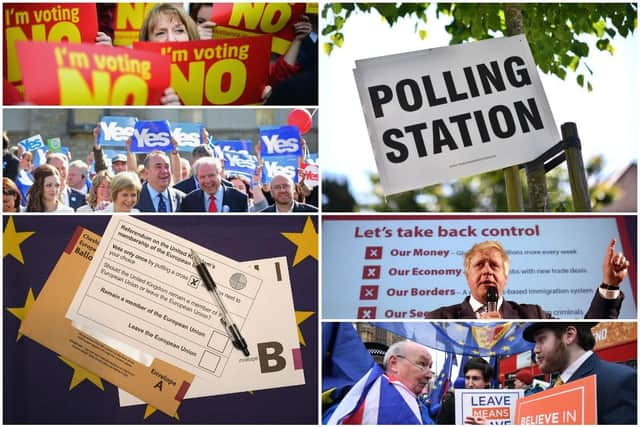It’s five years since our last UK-wide referendum, surely we must be due another?
and live on Freeview channel 276
OK, I know what you’re thinking, but just hear me out on this one.
Whatever you think about the result, the Brexit referendum showed in many ways the worst of what politics and campaigning can be.
Advertisement
Hide AdAdvertisement
Hide AdWe want to hear from you: let us know what you think about this story and be part of the debate in our comments section below


Dodgy claims about NHS funding or immigrants from Turkey were met with supposedly pro-EU arguments that were flimsy and lukewarm at best, and morally scolding at worst.
And things haven’t been much better since the vote.
Approximately half the population felt that the country was about to commit a grievous act of self-harm and, understandably, kicked off accordingly. This prompted anger among the other half of the country, who were already quite frustrated, understandably, that the thing they voted for didn’t seem to be happening.
The EU referendum was always going to be divisive, and how we handle divisive issues both in the media and within our political sphere clearly needs to improve - but that can’t happen without practice.
Advertisement
Hide AdAdvertisement
Hide AdAnd for all that was wrong with it, it was also the largest act of participatory democracy in our history and it gave ordinary people a direct say on something which had a major impact on their lives.
That’s why, despite my better judgement, I think we should have another referendum on something else entirely. Then another. And another after that.
What we need is more opportunity to make direct decisions about issues that impact our lives, which is why we should have a referendum every decade at least.
We’re often keen to boast of our credentials as a democracy, but between the archaic and unrepresentative first-past-the-post voting model and an overly-centralised system too reliant on Westminster, we’re not exactly a poster-child for democratic participation.
Advertisement
Hide AdAdvertisement
Hide AdThey could be on anything, from drug reform, to social care; from a Universal Basic Income to whether the BBC retains its license fee model.
In terms of empowering people to affect change in society, and boosting access to direct democracy, the implications of the idea are clear.
But having another referendum on a different issue entirely might also serve to help heal the wounds of the last one.
For those who feel like they “lost” the first referendum, this might present opportunities to “win” one, and knowing that referendums come along with some regularity might take away the sting of being on the losing side.
Advertisement
Hide AdAdvertisement
Hide AdTo those who say that referendums are too crude a device to determine complex or nuanced issues, you may be right, it likely wouldn’t suit every issue.
But perfection shouldn’t be the enemy of progress, and the prospect of further referendums might allow us as a society to look forward to the next, rather than always backwards to the last.
Asking the public to vote on an important issue every decade at least would not only be a radical expansion of our democracy, but an act of faith in ourselves as the people of this country to determine our own fate.
It would also encourage further participation in the democratic process, which gives people more of a stake in society, in-turn making them more likely to serve it better.
On an individual level, we would all likely win some and lose some. But collectively, we all stand to gain.
And hey, if you’re still not convinced, maybe we could have a referendum on it?
Comment Guidelines
National World encourages reader discussion on our stories. User feedback, insights and back-and-forth exchanges add a rich layer of context to reporting. Please review our Community Guidelines before commenting.